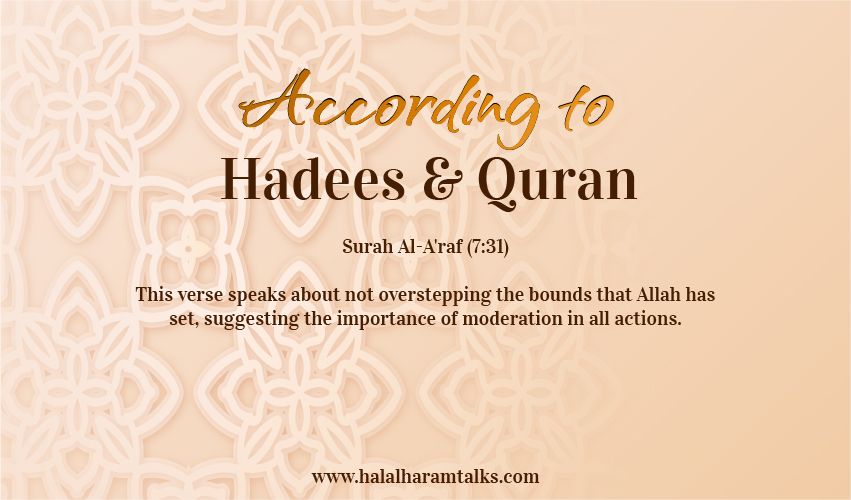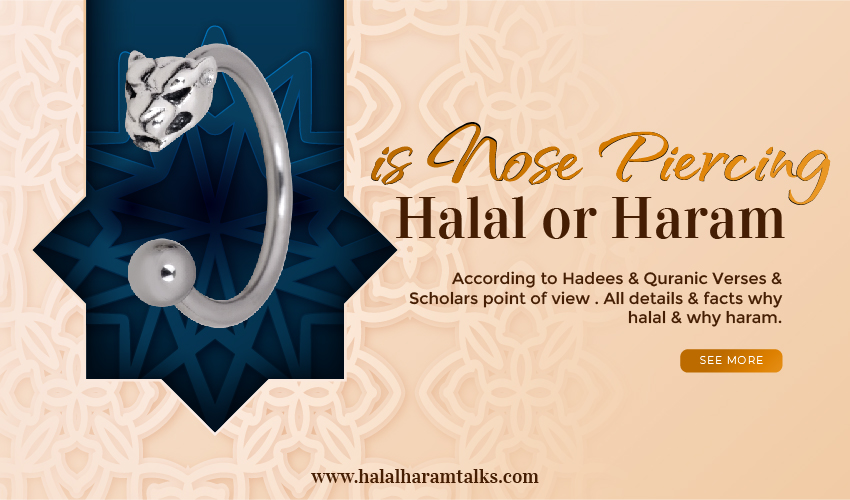Nose piercing has been a longstanding form of body modification practiced by various cultures around the world. Within an Islamic context, the permissibility of nose piercing, like many other forms of body art, is a topic of debate among scholars. In this article, we explore the question, “Is nose piercing Haram?” to shed light on the religious perspective and provide a comprehensive understanding of this issue.
Is Nose Piercing Haram?
The question of whether nose piercing is considered Haram (forbidden) or Halal (permissible) in Islam hinges on several factors. It is essential to examine the Quranic verses, Hadith (Prophetic traditions and sayings), and scholarly opinions to gain insight into the religious stance on this practice.
For more: Is Ear Piercing Haram
Why Is Nose Piercing Haram or Halal?
The Halal or Haram status of nose piercing mainly depends on the intention behind the act and the potential physical harm it may cause. Let’s delve into the various aspects that shape the perspective on this matter.
Intention and Purpose
A crucial factor in determining the permissibility of nose piercing is the intention and purpose behind the act. If the intention is to beautify oneself or adhere to cultural practices without going against Islamic principles, it may be considered permissible. However, if the intention is to imitate non-Muslim traditions or promote immorality, it becomes problematic.
Physical Harm
Islam places great emphasis on preserving one’s physical health and well-being. Nose piercing, when performed without proper hygiene or by inexperienced individuals, can lead to infections, allergies, and other complications. Scholars who deem it Haram often argue that it poses unnecessary risks and violates the principle of preserving one’s body.
Scholarly Opinions
Scholars’ opinions on nose piercing in Islam may vary. Some argue that it is forbidden based on the notion that modifying the creation of Allah is a form of disrespect. Others hold the view that nose piercing is permissible if done for cultural or personal reasons that do not contradict Islamic principles.
For more: Can Muslim Men Wear Gold
Quran Verses & Hadith Related to Nose Piercing
The Quran does not explicitly mention nose piercing. However, general guidelines and principles can be derived from verses that address modesty, self-preservation, and avoiding excess. While the interpretation of these verses may differ among scholars, they provide valuable insights into the broader Islamic perspective on body art.
| Quranic Verse | Brief Explanation |
|---|---|
| Surah Al-A’raf (7:31) | This verse speaks about not overstepping the bounds that Allah has set, suggesting the importance of moderation in all actions. |
| Surah Al-Ma’idah (5:87) | This verse advises believers not to make unlawful that which Allah has made lawful, highlighting the need to differentiate between cultural practices and those forbidden by Islam. |
Hadith, the recorded sayings and actions of the Prophet Muhammad (peace be upon him), offer further guidance regarding nose piercing:
- The Prophet Muhammad (pbuh) said: “Those who imitate any people are one of them.” This Hadith can be interpreted as a caution against blindly following practices that are contrary to Islamic teachings, including body modifications.
- The Prophet Muhammad (pbuh) also emphasized the importance of maintaining good health. In a Hadith narrated by Abu Dawood, he said: “Your body has rights over you.” This Hadith underscores the significance of preserving one’s physical well-being and avoiding practices that may harm the body.

Is Nose Piercing Haram in Islam?
The Halal or Haram status of nose piercing varies depending on the interpretation of Islamic teachings. While some scholars argue it is Haram due to the potential health risks and the principle of not modifying Allah’s creation, others permit it if done for cultural or personal reasons that align with Islamic values.
For more: Is Tattoo Haram
Is Nose Piercing Haram for Females?
The permissibility of nose piercing for females draws upon the same factors mentioned earlier – intention, purpose, and physical harm. If performed with a valid intention, such as cultural practices or personal adornment that does not contradict Islamic teachings, it may be considered permissible. However, excessive modification or imitating non-Islamic practices can render it Haram.
For more: Is It Haram To Kiss Before Marriage
Is Nose Piercing Haram for Males?
Similar to females, the permissibility of nose piercing for males depends on the same considerations – intention, purpose, and physical harm. In many cultures, nose piercing is primarily associated with females, while for males, it may carry different meanings. If the intention aligns with cultural practices or personal adornment not contrary to Islamic teachings, it may be deemed permissible.
Proof of Nose Piercing Being Haram
Those who argue that nose piercing is Haram base their stance on multiple principles, including:
- Modifying Allah’s Creation: Altering one’s body may be viewed as disrespectful to its original form, as Muslims believe that Allah has created everything perfectly, and it should not be altered or modified.
- Potential Health Risks: Nose piercing can pose various health risks, such as infections, allergies, and complications during the healing process. Scholars who consider it Haram argue that it contradicts the Islamic principle of preserving one’s physical well-being.
- Cultural and Religious Imitation: Some argue that nose piercing is Haram because it imitates non-Muslim practices or follows cultural norms that go against Islamic teachings. Islam encourages Muslims to maintain their unique identity and avoid blindly imitating others.
For more: Is It Haram To Have Crush
FAQs
No, the Quran does not specifically mention nose piercing. However, general principles and guidelines regarding modesty, self-preservation, and avoiding excess can be derived from various Quranic verses.
Nose piercing is often rooted in cultural practices and can be viewed as a form of cultural expression. However, it is important to align cultural practices with Islamic teachings to ensure they do not contradict or go against Islamic principles.
Like any body modification, nose piercing carries potential health risks, including infections, allergies, and complications during the healing process. It is vital to undertake the procedure in a hygienic manner and follow proper aftercare instructions to minimize these risks
Muslims should consider their intention behind getting a nose piercing, the potential physical harm it may cause, and the alignment with Islamic teachings and values. Seeking knowledge from reputable scholars and evaluating individual circumstances can help in making an informed decision.
Conclusion
The question of whether nose piercing is Haram in Islam is a subject of differing opinions among scholars. The permissibility depends on the intention behind the act, potential physical harm, and adherence to Islamic principles.
While some scholars argue that nose piercing is Haram due to the risks involved and the concept of modifying Allah’s creation. Others permit it if done for cultural or personal reasons that align with Islamic values. It is vital to understand the context, seek knowledge from reputable scholars. And make informed decisions based on one’s understanding and beliefs.
If you seek further guidance and knowledge on what is Halal (permissible) and Haram (forbidden) in Islam. We encourage you to explore our website. Understanding the principles and teachings of Islam can provide clarity on various aspects of life. Helping individuals make informed choices in accordance with their faith.
